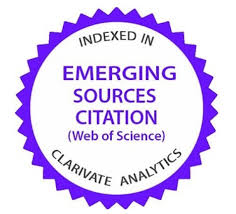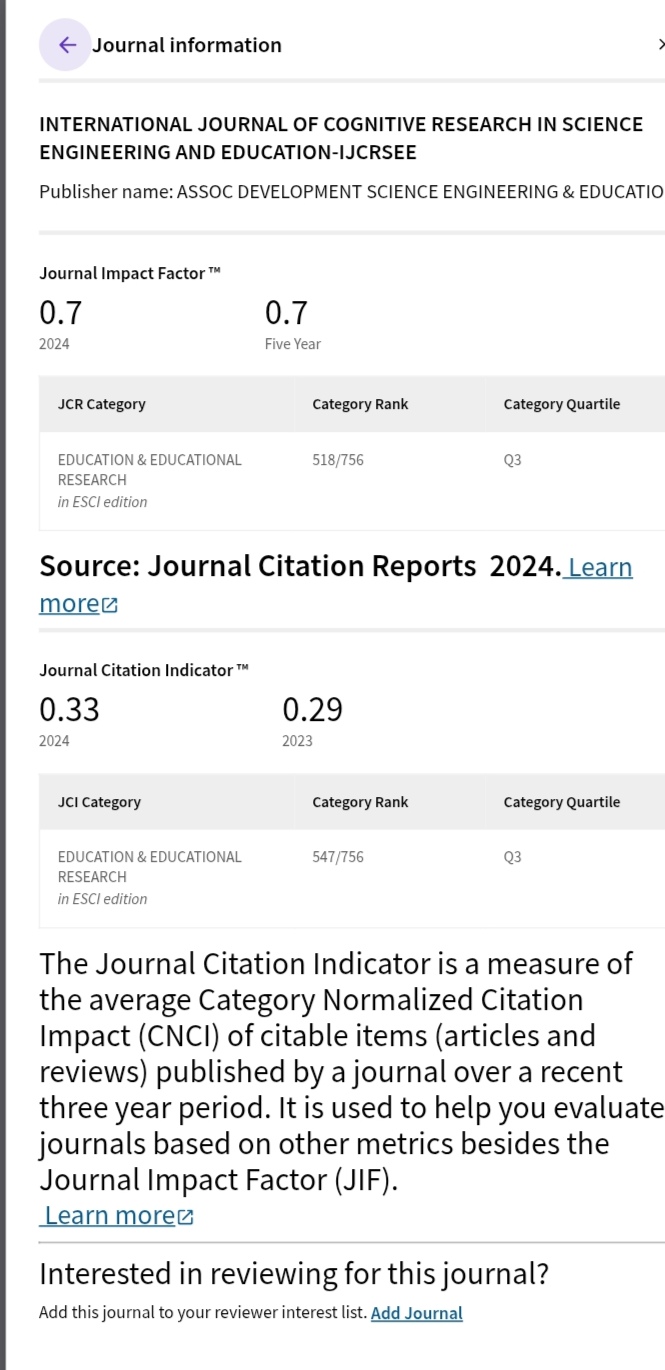RELATIONSHIP BETWEEN THE QUALITY OF HIGHER EDUCATION AND BALKAN COUNTRIES’ COMPETITIVENESS
DOI:
https://doi.org/10.5937/IJCRSEE1903049SKeywords:
Balkan countries, competitiveness, development, education, higher educationAbstract
The main purpose of the research is to determine the link between the quality of higher education and the competitiveness level of the Balkan countries. In addition, the goal is to identify critical factors in the field of higher education that require improvement. The methods used in the paper are comparative analysis, descriptive statistics, correlation analysis, cluster analysis and benchmarking analysis. The results of the research point to the fact that there is no high positive correlation between the quality of higher education and the competitiveness level of the Balkan countries. However, it is noticed that the Balkan countries record better results when it comes to higher education than the level of competitiveness. Apart from the necessity of improving certain domains of higher education, the priority of the education policy and development policy makers in the Balkan countries should be the utilization of the results achieved in education in the function of improving competitiveness.
Downloads
References
Aleksejeva, L. (2016). Country’s competitiveness and sustainability: higher education impact. Journal of Security and Sustainability Issues, 5(3), 355-363. http://dx.doi.org/10.9770/jssi.2016.5.3(4)
Balkyte, A., & Tvaronavičiene, M. (2010). Perception of competitiveness in the context of sustainable development: facets of “sustainable competitiveness”. Journal of business economics and management, 11(2), 341-365. https://doi.org/10.3846/jbem.2010.17
Cremin, P., & Nakabugo, M. G. (2012). Education, development and poverty reduction: A literature critique. International Journal of Educational Development, 32(4), 499–506. https://doi.org/10.1016/j.ijedudev.2012.02.015
Cretan, G. C., & Gherghina, R. (2015). Funding higher education in a few EU countries: Implications for competition and competitiveness in higher education. Journal of Knowledge Management, Economics and Information Technology, 5(1), 1-22. http://citeseerx.ist.psu.edu/viewdoc/download?doi=10.1.1.685.3886&rep=rep1&type=pdf
Đurić, D., Mitrović, V., Đurić, D., & Ristić, J. (2018). Strengthening international competitiveness and investment growth as the basis for a new model of Serbian economy development. Economics of Agriculture, 65(2), 731-744. https://doi.org/10.5937/ekoPolj1802731D
Fonseca, L., & Lima, V. (2015). Countries three Wise Men: Sustainability, Innovation, and Competitiveness. Journal of Industrial Engineering and Management, 8(4), 1288-1302. http://dx.doi.org/10.3926/jiem.1525
Fonseca, L. M., Portela, A. R., Duarte, B., Queirós, J., & Paiva, L. (2018). Mapping higher education for sustainable development in Portugal. Management & Marketing. Challenges for the Knowledge Society. 13(3), 1064-1075. https://doi.org/10.2478/mmcks-2018-0023
Hebibi, L., Raimi, N., & Milićević, R. (2019). Knowledge management and the importance of knowledge management for the organization’s performance. Ekonomika, 65(1), 117-126. https://doi.org/10.5937/ekonomika1901117H
Kabók, J., Kis, T., Csüllög, M., & Lendák, I. (2013). Data envelopment analysis of higher education competitiveness indices in Europe. Acta Polytechnica Hungarica, 10(3), 185-201. Retrieved from https://www.uni-obuda.hu/journal/Kabok_Kis_Csullog_Lendak_41.pdf
Keser, H. Y. (2015). Effects of higher education on global competitiveness: reviews in relation with European countries and the middle east countries. Annals of’ Constantin Brancusi ‘University of Targu-Jiu. Economy Series, 1(1), 58-68. Retrieved from http://www.utgjiu.ro/revista/ec/pdf/2015-01.Volumul%201/08_Hilal%20Yildirir.pdf
Kovaleva, N. I., Valeyeva, N. S., Avilova, N. L., Kharisova, G. M., Khayrutdinov, R. R., Khairullin, E. R., & Shaikhlislamov, A. K. (2015). Recommended practices for improving the competitiveness of the Russian education services market under the conditions of the international educational integration. Review of European Studies, 7(4), 1-5. http://dx.doi.org/10.5539/res.v7n4p1
Krstić, B., & Stanišić, T. (2013). The influence of knowledge economy development on competitiveness of southeastern Europe countries. Industrija, 41(2), 151-167. doi: 10.5937/industrija41-4000
Krstić, B., & Stanišić, T. (2016). Zdravstvo i osnovno obrazovanje kao determinantne konkurentnosti privrede Republike Srbije. [Health and primary education as determinants of competitiveness of the Serbian economy]. In B. Krstić (Ed.), Faktori konkurentnosti Republike Srbije [Factors of competitiveness of the Republic of Serbia] (pp. 87-106). University of Niš, Faculty of Economics.
Krstić, B., Petrović, J., & Stanišić, T. (2015). Influence of education system quality on the use of ICT in transition countries in the age of information society. TEME, 39(3), 747-763. Retrieved from http://teme2.junis.ni.ac.rs/index.php/TEME/article/view/75/43
Lane, J. E. (2012). Higher education and economic competitiveness. In Lane J. E. and Bruce J.D. (Eds.) *Universities and colleges as economic drivers: Measuring higher education’s role in economic development* (pp. 1-30). Albany: State University of New York Press.
Lauder, H., Brown, P., Dillabough, J. A., & Halsey, A. H. (2006). Education, globalization, and social change. Oxford university press. Retrieved from https://researchportal.bath.ac.uk/en/publications/education-globalization-and-social-change
Mason, R. D., Lind, D. A., & Marchal, W. G. (1983). Statistics: an introduction. New York: Harcourt Brace Jovanovich.
Mayo, P. (2009). Competitiveness, diversification and the international higher education cash flow: the EU’s higher education discourse amidst the challenges of globalisation. International Studies in Sociology of Education, 19(2), 87-103. http://dx.doi.org/10.1080/09620210903257174
Miller, D. L. (2013). Universities and Colleges as Economic Drivers: Measuring Higher Education’s Role in Economic Development (Book Review). Planning for Higher Education, 41(4), 135-137. Retrieved from https://search.proquest.com/openview/056fb835c0bf2566681bde9a9bc92949/1?pq-origsite=gscholar&cbl=47536
Pavlin, S., & Svetlicic, M. (2012). Higher education, employability and competitiveness. Hacettepe Üniversitesi Eğitim Fakültesi Dergisi, 43(43), 386-397. https://eric.ed.gov/?id=EJ979698
Persaud, A. (2017). Integrated planning for education and development. European Journal of Education, 52(4), 448–459. https://doi.org/10.1111/ejed.12233
Petrović, P., & Živković, D. (2017). Continuing education of hotel employees and their shared vision of the organization. Menadžment u hotelijerstvu i turizmu – Hotel and Tourism Management, 5(1), 85-93. Retrieved from http://www.htmanagementvb.com/index.php/HITM/article/view/29
Puška, A., & Beganović, A. I. (2016). Primjena klaster analize u ekonomskim istraživanjima [The Implementation of Cluster Analysis in Economic Research]. Oeconomica Jadertina, 6(1), 3-19. Retrieved from https://hrcak.srce.hr/168460
Radovanović, V., & Rendulić, V. (2017). With knowledge and innovation in new tourism venture. Menadžment u hotelijerstvu i turizmu – Hotel and Tourism Management, 5(2), 96-105. Retrieved from http://www.htmanagementvb.com/index.php/HITM/article/view/12
Schofer, E., & Meyer, J. W. (2005). The worldwide expansion of higher education in the twentieth century. American Sociological Review, 70(6), 898-920, https://doi.org/10.1177/000312240507000602
Sekuloska, J. D. (2014). Higher education and training as crucial pillars in creating the competitiveness of nation. Procedia-Social and Behavioral Sciences, 156(26), 241-246. https://doi.org/10.1016/j.sbspro.2014.11.182
Şener, S., & Sarıdoğan, E. (2011). The effects of science-technology-innovation on competitiveness and economic growth. Procedia-Social and Behavioral Sciences, 24, 815-828. https://doi.org/10.1016/j.sbspro.2011.09.127
Stanišić, T., & Leković, M. (2018). ICT readiness as a factor of tourism competitiveness. In D. Cvijanović et al. (Eds.), Tourism in Function of Development of the Republic of Serbia - Tourism in the Era of Digital Transformation (pp. 390-406). University of Kragujevac, Faculty of Hotel Management and Tourism in Vrnjačka Banja. Retrieved from http://www.tisc.rs/proceedings/index.php/hitmc/article/view/23
Stonkiene, M., Matkeviciene, R., & Vaiginiene, E. (2016). Evaluation of the national higher education system’s competitiveness: Theoretical model. Competitiveness Review, 26(2), 116-131. https://doi.org/10.1108/CR-06-2015-0055
Stošić, L. (2015). The importance of educational technology in teaching. International Journal of Cognitive Research in Science, Engineering and Education (IJCRSEE), 3(1), 111-114. https://ijcrsee.com/index.php/ijcrsee/article/view/122
Sum, N.-L., & Jessop, B. (2013). Competitiveness, the knowledge-based economy and higher education. Journal of the Knowledge Economy, 4(1), 24-44. https://doi.org/10.1007/s13132-012-0121-8
Taylor, R. (1990). Interpretation of the Correlation Coefficient: A Basic Review. Journal of Diagnostic Medical Sonography, 6(1), 35–39. https://doi.org/10.1177/875647939000600106
Van der Wende, M. C. (2000). The Bologna Declaration: Enhancing the transparency and competitiveness of European higher education. Journal of Studies in International Education, 4(2), 3-10. https://doi.org/10.1177/102831530000400202
Weber, J. C., & Lamb, D. R. (1970). Statistics and Research in Physical Education. St. Louis: CV Mosby Co.
WEF. (2017). The Global Competitiveness Report 2017–2018. World Economic Forum, Geneva.
Published
How to Cite
Issue
Section
License
Copyright (c) 2019

This work is licensed under a Creative Commons Attribution-NonCommercial-NoDerivatives 4.0 International License.












